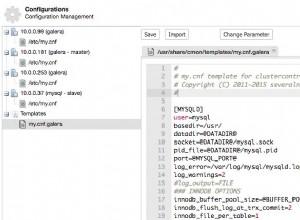Remova o
{ "$sum": 1 } e { "$sum": 0 } expressões em seu if/else blocos condicionais, substitua-os pelos valores 1 e 0 (respectivamente para cada bloco condicional). O pipeline final deve ficar assim, usando os outros
$cond
sintaxe que omite o if/else blocos:db.names.aggregate([
{
"$group": {
"_id": "$name",
"error": {
"$sum": {
"$cond": [ { "$eq": [ "$loglevel", "ERROR" ] }, 1, 0]
}
},
"warning":{
"$sum": {
"$cond": [ { "$eq": [ "$loglevel", "WARNING" ] }, 1, 0 ]
}
},
"info": {
"$sum": {
"$cond": [ { "$eq": [ "$loglevel", "INFO" ] }, 1, 0 ]
}
}
}
}
])
Ou crie dinamicamente o pipeline, com uma variedade de status possíveis:
var statuses = ["ERROR", "WARNING", "INFO"],
groupOperator = { "$group": { "_id": "$name" } };
statuses.forEach(function (status){
groupOperator["$group"][status.toLowerCase()] = {
"$sum": {
"$cond": [ { "$eq": [ "$loglevel", status ] }, 1, 0]
}
}
});
db.names.aggregate([groupOperator]);
Saída
/* 1 */
{
"_id" : "t1",
"error" : 2,
"warning" : 3,
"info" : 1
}
/* 2 */
{
"_id" : "t2",
"error" : 4,
"warning" : 0,
"info" : 1
}
/* 3 */
{
"_id" : "t3",
"error" : 0,
"warning" : 0,
"info" : 1
}




